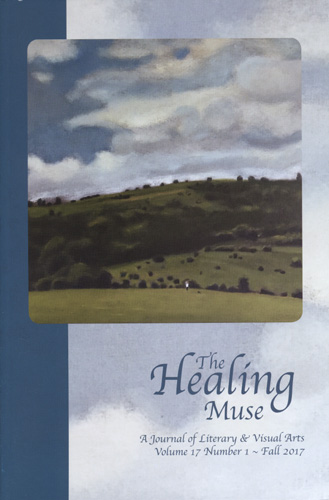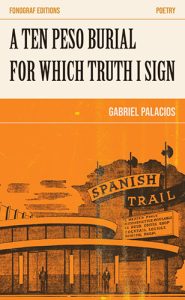The Healing Muse – Fall 2017
As a journal published by the Center for Bioethics and Humanities, The Healing Muse has a commitment to encouraging healthcare that is personal and compassionate. In a time when our access to healthcare in America is being regularly threatened, the work done by this journal is essential as ever. Featuring work that centers exclusively on the body and illness, The Healing Muse is a shining example of the power of medical humanities.
In her editor’s note, Deirdre Neilen describes editions of The Healing Muse as “an annual family reunion.” Like Neilen, poetry has always felt like a home to me, and I imagine in times of hardship and need, I too would want to wrap myself in literature for strength, solidarity, and honesty.
The pieces in the Fall 2017 issue take the reader on personal journeys of hardship, grief, and, of course, healing. They offer embraces wherever you are: a coffee shop, the doctor’s office, your home, a hospital bed, or a place of mourning. Neilen offers you a seat at the family reunion. She writes, “the family is here and waiting for you to join us.” I have never felt so welcomed and warmed by a journal.
This edition of The Healing Muse contains 148 pages of poetry, prose, and art on a variety of medical topics like cancer, aging, loss of loved ones, and addiction. Many of the contributors for this edition are also medical professionals themselves. Philip Berry’s poem “Sincerity” is published here, and his bio identifies him as both a writer and a National Health Service Consultant in London. The poems directly from medical professionals are particularly moving, since they often feel confessional in nature. Berry’s poem reflects on discussing diagnoses with patients:
those fearful eyes
don’t surprise meyet, leaning forward
I choke, shaken
by the singularity.
Despite the family reunion feeling Deirdre Neilen writes about in her editor’s note, many poems remind us that we face our illnesses very much alone. Each recovery or decline is strikingly singular and personal.
The journal is also not without humor. Deirdre Henning’s poem “Like a Wary Anhinga . . . ” describes caring for a very ill loved one. The loved one has “ever changing pills” and “mouth ulcers.” Still they seem to find moments of normalcy and joy. She writes, “your eyes twinkle with the same old mischief. / You reach under my shirt, crow ‘Loose Nipple Syndrome!’ / and tweak my knobs.” In this moment, she writes, “the bird inside me soars.” To those who are severely ill and to those who love those who are severely ill, the simplest pleasures and the corniest jokes bring monumental joys.
The healing nature of sharing is just as common in these pages. As Joyce Holmes McAllister writes in “Writing it Out,” the poem on the first official page of the journal:
words opened grief, made it free
to run its length across the page,
[ . . . ]
They softened
pain, made spirit heal.
This journal is something more than the sum of its parts. It is a place where we face our mortality head on and celebrate life. Every page feels urgent and essential. I’ll be keeping this issue close to me until I can get my hands on the next one.
[www.upstate.edu/bioethics/thehealingmuse]





